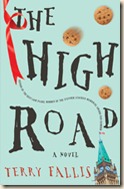Libraries are in need everywhere, but here's one initiative - the brainchild of Canadian author Helaine Becker - that actually took flight. Three of my novels, including
Abby and the Curling Chicks, Wild Dog Summer, and
The Toymaker's Son will be among the books finding a home on the shelves of Ralph Bunche Elementary in Los Angeles.
Five authors are making the trek to deliver the books and show support for a school library in need. Read on for the official press release:
ACCESS BOOKS AND "AIR LIFT TO L.A." DELIVER BOOKS
TO COMPTON SCHOOL ON OCTOBER 2
Los Angeles – As part of their ongoing commitment to strengthen inner-city school libraries throughout Los Angeles and beyond, Access Books has joined forces with a team of Canadian authors to help impoverished families gain access to books. The event will take place at Ralph Bunche Elementary (16223 Haskins Lane, Carson, CA 90746-1092) on October 2, 2010 at 9 a.m. This school is one of 25 elementary schools in the Compton Unified School District (CUSD) that is in desperate need of books for its 450 students.
Access Books, "Air Lift to L.A." and a team of volunteers from Bunche will spend October 2nd revitalizing the library by painting murals and cataloging brand new books. In addition to the books, Access Books will provide a reading rug, rocking chair and sofa to create a warm and inviting environment for students. Five authors from Canada will be on hand for the event and to give fun and exciting presentations to the students.
The participating authors are:
Rob Weston, author of Silver Birch award winner
Zorgamazoo
Kari-Lynn Winters, author
Jeffrey and the Sloth,
On My Walk, and other award-winning books.
Jill Murray, YA author of
Rhythm and Blues and
Break on Through
Wendy Kitts, Freelance Writer, Book Reviewer, and author of a soon-to-be published picture book from Nimbus Press
Helaine Becker, author of more than 40 books for children including Silver Birch award winners
Boredom Blasters and
Secret Agent Y.O.U.
Sadly, only 48 percent of Bunche's students are scoring "proficient" or "advanced" in English & Language Arts on the California Standards Test. Research has shown that the best predictor of how well a child will learn to read is the number of books to which he or she has access, but 61 percent of economically disadvantaged children don't have age-appropriate books at home. The students of Bunche Elementary fit this profile: 90 percent live at or below the poverty line. According to a 2009 report from the Jumpstart Foundation, communities ranking high in achievement tests share a common denominator: an abundance of books in their libraries.
California's Department of Education recommends 28 library books per student, according to the February 2010 draft of its School Library Standards. Bunche, however, has a mere three books per student. Therefore, Access Books has set a goal: Collect at least 5,000 books for Bunche's library and classrooms. Many of these will be brand new, popular fiction titles – books that have been carefully selected to get students excited about reading.
Access Books' partner for this endeavor, "Air Lift to L.A.," grew wings after Canadian children's author Helaine Becker visited a Long Beach elementary school and saw the empty shelves. Shocked and saddened, she rallied her Canadian colleagues and started a book drive. "The conditions [in Los Angeles] are on par with the worst of the Third World countries," she writes on the "Air Lift to L.A." Facebook page. "Actually, they are worse, because in much of the Third World, people are doing their best to raise their standards, while in Los Angeles, conditions have deteriorated abysmally in the last ten years."
Bunche has just moved its campus library into a new, larger space to afford room for growth, but unfortunately, many of the shelves are bare. The library assistant nicknamed the library "The Dream Shop," but with so few books, its dreams have yet to be realized.
California ranks last in the nation in funding for school libraries, spending less than one dollar per child. Although the 2011 federal budget proposal includes a $400 billion investment in education, there's no mention of federal funds specifically geared toward school libraries. According to Sandra Barnett, head of the American School Library Association, "the budget is proposing to take away the last access to literacy for these kids in high-poverty areas." The American School Library research data clearly shows that students with access to school libraries and good books score higher in state reading scores and are more interested in reading.
"I think the big issue is that we really need to make reading part of school and make reading fun and interesting," said Rebecca Constantino, P.h.D., the founder and executive director of Access Books. "And that starts with having a good library."
About ACCESS BOOKS: Access Books provides quality, high-interest books to Southern California's most impoverished school libraries. Since 1999, they have donated more than a million books to school and community libraries in the greater Los Angeles area. Access Books has been featured in USA Today, the L.A. Times, the New York Times and School Library Journal among many other media outlets. Access Books' founder, Rebecca Constantino, is a recipient of Oprah's "Use Your Life" award. She has published over 100 articles and a book in the areas of literacy development, equity in education, urban school and cultural perspectives of language acquisition.
Give a Child a Book, She'll be Happy
Give a Child a Library, She'll be Literate
P.O. Box 64951, Los Angeles, CA 90064
310-284-3452
www.accessbooks.net
 The plan was to spend the month of November hammering out a novel.
The plan was to spend the month of November hammering out a novel. 

![TBLP[1] TBLP[1]](http://lh5.ggpht.com/_4AzgHTDEUDI/TI4gwjZUiiI/AAAAAAAAAUg/cRiSc3umMpY/TBLP%5B1%5D_thumb%5B1%5D.jpg?imgmax=800)










